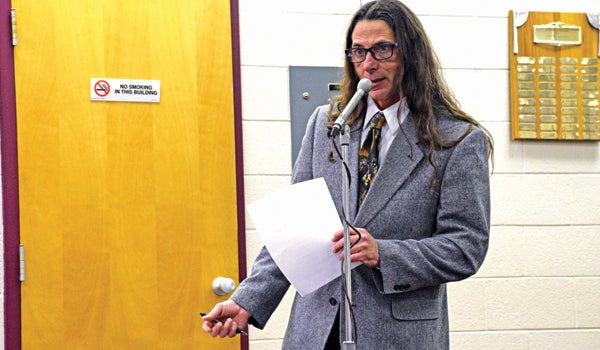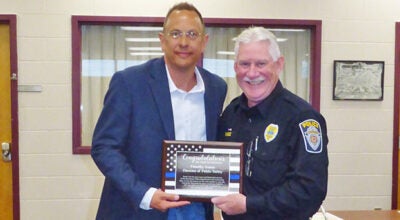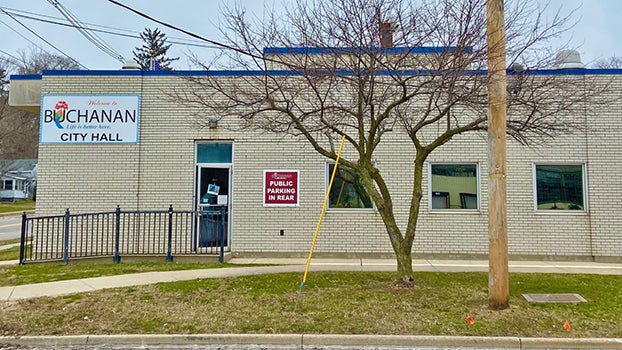Commission looking into medical marijuana provision centers
Published 9:01 am Wednesday, January 11, 2017

- Johnny Wallace, of Buchanan, spoke to the Buchanan City Council Monday evening to persuade them to pass legislation that would allow him to open a medical marijuana provision center on Red Bud Trail. (Leader photo/JOE KUHARIC)
Plans for the City of Buchanan to allow medical marijuana provision centers to operate are budding.
Buchanan’s Johnny Wallace approached members of the city council during the Dec. 12 regular meeting to ask that they take steps to allow him to open a medical marijuana dispensary along Red Bud Trail.
He returned Monday — the next meeting of the council — with a group of a little more than a half-dozen supporters, as well as signed surveys and informational booklets for the council.
“I wanna help the community. I wanna help the people get the medicine they need,” Wallace said. “That is my ultimate goal. That is really what I wanna do.”
Wallace brought surveys on whether or not people would like to see a provision center, which he plans to turn over to the state to turn into a petition, signed with 787 yeses and three nos.
The council seemed receptive to the idea, but none of the members have thrown their full support behind the measure.
“You are doing the right thing by chasing this,” said Buchanan Councilman Dan Vigansky. “We have done a lot of work already on it, believe it or not.”
Vigansky wanted to make sure that the people who signed Wallace’s survey were registered voters in Buchanan, and not just registered voters because it will be an important distinction to make. Wallace said he was not sure, and was not sure how to find out that information.
Councilman Dale Toerne suggested Wallace check with the board of elections or the city clerk to check on the signatures he received to find out if people who signed are registered voters, and that Wallace write a letter to State Representative Dave Pagel and U.S. Representative Fred Upton to get them to weigh in on the issue.
Mayor Brenda Hess also suggested Wallace encourage members of the public to write letters to the commission with testimonial information from members of the public as a way for him to build a case in favor of opening a provision center.
“[The receptiveness of the council] has been awesome. It seems to be good, ya know?” Wallace said in an interview. “The response of the people, too. I mean it is just great. It is overwhelming.”
The council still needs to work out several logistical challenges before a vote would take place.
“Some of our challenges will be in the zoning area,” said Bill Marx, the city manager for Buchanan, during the Dec. 12 meeting. “We’ll have to alter our zoning to allow this.”
The council will be hosting a joint workshop with the city commission and the planning commission at 7 p.m. Tuesday, Feb. 7, where they will dive deeper into materials to find out what steps they will need to take to legally establish a provision center in the city. The session will be open to the public, and there will be a presentation and an open discussion.
Councilman Dan Vigansky encouraged Wallace to continue to press the issue, but offered a word of warning.
“Berrien County is one of the more conservative counties in the state, so you are fighting a very strong, hard fight,” Vigansky said. “I just want to let you know that up front.”
Wallace is hoping to open the provision center under the recently enacted Michigan House Bill 4209. The bill, which was signed into law on Dec. 20, allows for the licensure and regulation of medical marijuana growers, processors and facilities, and allows state and local governments to create boards, advisory panels and systems for commercial transactions.
However, applications for a license to open a dispensary may not be submitted until Dec. 15, 2017, according to the bill. Dispensaries will also need to comply with a separate bill, House Bill 4827, which requires them to participate in a statewide monitoring and tracking system for licensed medical marijuana users.
The law will impose a 3 percent tax on gross retail income from dispensaries, which lawmakers estimate could bring in $24 million in revenue to the state once facilities become established. It is unclear in the bill if Michigan’s 6 percent sales tax would also apply to the sale of medical marijuana, but lawmakers project that tax would see revenues of $50 million per year.
The Department of Licensing and Regulatory Affairs estimates that the ongoing cost associated with the bills will total $21.1 million annually.
“You are gonna have to put one heckuva business report together,” Vigansky told Wallace. “Keep getting with the people that have the money to back you up, before we get tangled up in this too much, as to how much this is going to cost you and what the real pitfalls are gonna be. Because about the time you think you have got it together, Michigan is going to throw you a curve. I guarantee it.”






